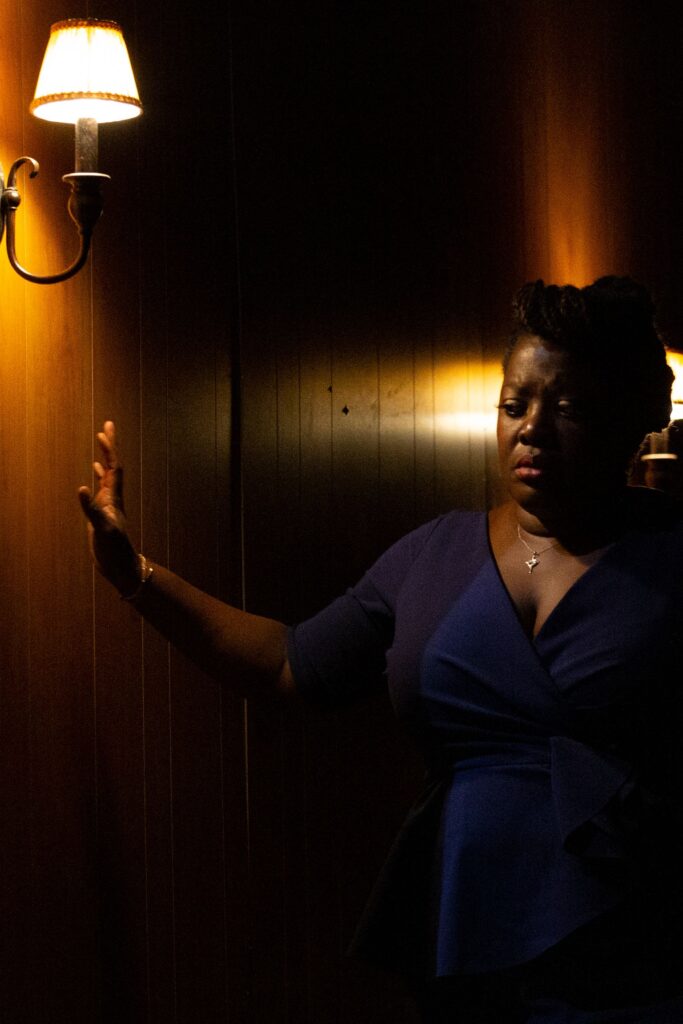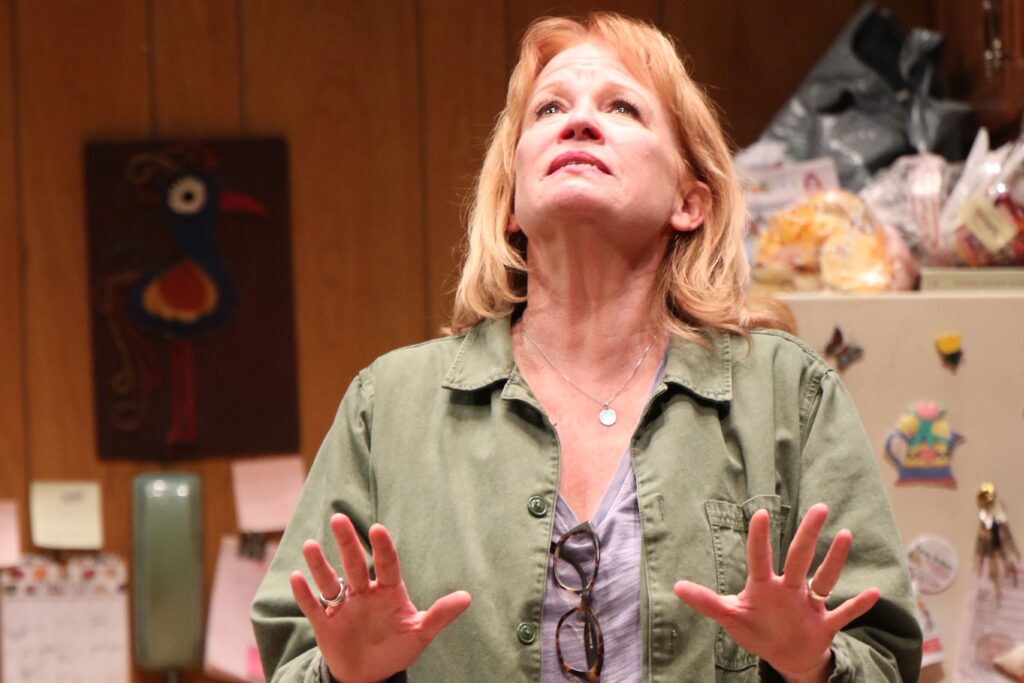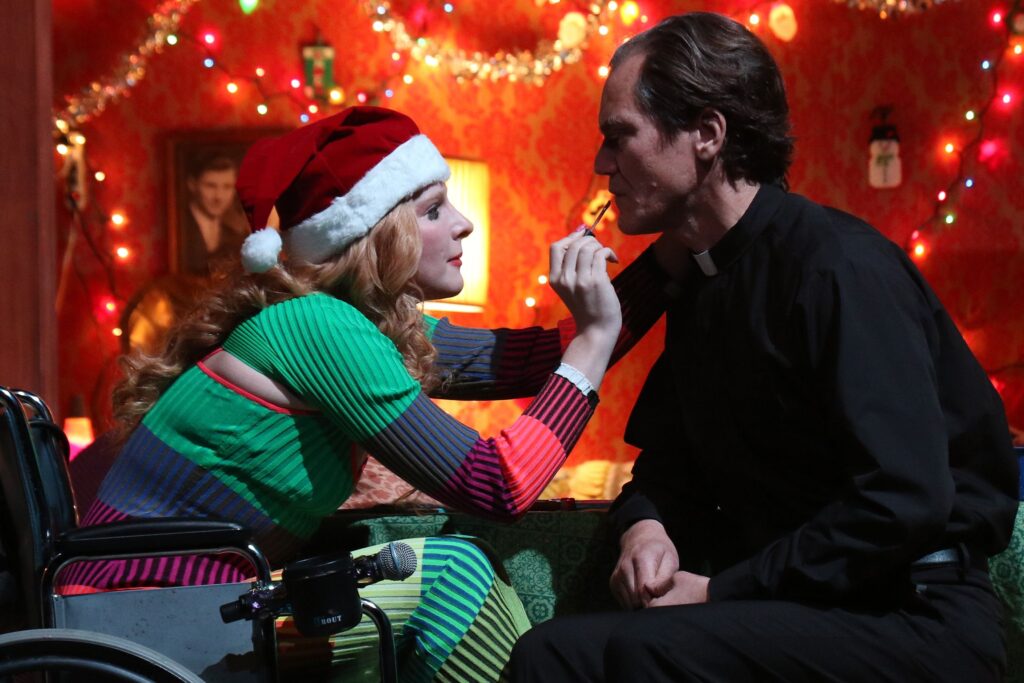An Argument About God and What Awaits Us From a Writer Who Would Not Argue About God or What Awaits Us: On Des Moines, the Final Play of Denis Johnson

It was in 2017, late spring verging on summer, that author, poet, and playwright Denis Johnson transitioned from living to non-being. Reportedly, he was situated in Gualala, California, a community called Sea Ranch, close to the Pacific. The cause was his liver, or rather, chaotic and relentless growth from inside that organ, which someone who knew him only by his writing could still reasonably surmise he had placed all kinds of stress on over the course of his sixty-seven years circling the sun. Doctors have a name for the disease that took him, one we know too well; it was a principal gift of Johnson’s as a writer to state the most plainly obvious facts not in a received way, but just how such facts land with those under the ecstatic influence of being themselves. Most of all, as a writer, he appears to have been enthralled by such ruptures, moments when the plain and obvious and consensus-mandated gave way to the wild and inchoate and frankly untamed interiors dwelling beneath the surface of things. The gem-like quality of his prose, at its best, shines like someone trying to feel a way out from darkness.
I have been an avid reader of that prose and a little of the poetry since an early writing teacher put Jesus’ Son in my hands my freshman year of college in Vermont. This isn’t a unique story for a writer who came of age in the ’90s. Yet the truth is, I had never seen or read any of his dramatic work, only really having heard about it second-hand at a memorial at the 92nd Street Y in October of the year Johnson passed. That night, among the literary eminences who read, appeared a slew of actors of stage and screen—Billy Crudup, who starred in Alison Maclean’s film adaptation of Jesus’ Son; Deirdre O’Connell; Kevin Corrigan, who after a personal anecdote or two about what Johnson meant to him, read affectingly from Johnson’s poetry, something set in a barbershop if I recall; Emily McDonnell; Will Patton, who broke what looked like an actual bottle over his head; and Michael Shannon. Most every actor who took the stage alluded to Johnson’s plays. Des Moines, it turns out, was already gestating, had already been staged even, numerous times: directed by and starring Patton at Tribeca’s Flea Theater in 2008, with McDonnell and O’Connell in two of the principal roles.
The play has become something different than it once was. The program notes by Jeffrey Horowitz, founding Artistic Director of Brooklyn-based Theater for a New Audience, suggest that even following a dramatic re-envisioning of the work in 2015, under TFANA’s banner—a collaboration that included Johnson, dramaturg Jonathan Kalb, director Arin Arbus, Horowitz, and a company of actors—the project was nevertheless shelved as too difficult. After ceding to the 2015 collaboration, Johnson refused to permit any further alterations to the text; it was only in the aftermath of the writer’s “unexpected” passing that the play took on, in Horowitz’s view, a new, “haunted” energy, and TFANA moved forward with plans to stage it.
And so, for only about a month, in late 2022 and into the first week of the new year, Des Moines played to audiences in Brooklyn as directed by Arin Arbus. After scoring a pair of press tickets at the last-minute, I ended up attending a few days after Christmas, with a younger friend, who, in turn, appeared to have roped in multiple members of her fiction MFA cohort by some blend of intention and chance. The stage set before us, which an early Playbill notice (circa 2008) describes as “a run-down Des Moines apartment,” now appeared to be a cluttered, if comfortably middle class kitchen in the Midwest, elevated on stilts to loom above much of the audience: faux wood-lined interiors, an oven mitt dangling from the stove door, a miscellany of bric-a-brac over top the cabinets, magnets on the fridge, and two sliding frosted glass doors immediately behind the cloth-bedecked table at center stage.
Did any of us know what to expect? This is Johnson, so a helping of mayhem seemed a decent guess, even if the author’s final published fiction collection, The Largesse of the Sea Maiden, features work mostly in a valedictory register, overt reveries of memory: deeds done, undone, boundaries toed, longings unearthed. A dinner host with a valuable painting over his fireplace feeds his purchase to the flames on the spur of the moment after his dinner guests beg him not to; a man at the Starlight Recovery Center in Ukiah, CA, writes to past loves, forsaken family, and assorted public figures, including Satan, seeking to account for the claustrophobic course the years have taken; a writer suspects a poet friend of having broken into a cemetery by night to disinter Elvis Presley’s stillborn twin. Will you believe me when I say that, subject matter aside, all of these stories register as fairly funny? Not, like, haha!, and not “one-joke-beat-per-paragraph” funny, but a deeper, aching kind, the sort with the power to send tremors through the bones. These are the stories Johnson was writing in the aftermath of that collaborative revision of Des Moines.

The play opens with a late middle-aged couple: stolid, self-assured, yet at a loss to account for certain aspects of the world beyond their door. Not an unheard of place for a late middle-aged couple to be. Dan (Arliss Howard) drives a cab for his livelihood and is in the process of explaining to wife Marta (Johanna Day) how that past week he had driven someone to the airport whose flight ended in “an aircrash.” The man’s widow, “a nice lady, a Black lady,” in Dan’s grasping language, then found him and wanted to know if he remembered anything about the ride, which would have included some of her late husband’s last spoken words. But “I couldn’t remember the guy,” Dan tells Marta. “Then he crashed.” He is speaking of the unfortunate departed, and yet, in some unacknowledged way, the fate concerning him seems to be his own, if only metaphorically. What is it that compels him to withhold from that bereft stranger, we wonder—what baseline of discomfort or lack of human generosity? Marta’s spaghetti, a favorite of Dan’s, reheats in the microwave. Both Dan and Marta turn to the humming machine, and a few laughs sounded from the Brooklyn audience at their silence. We laugh, sure, but maybe that has been us too, awaiting the immanence of a microwave’s chiming.
Dan recounts how when they met up the widow let him hold her deceased husband’s wedding band, recovered from the crash site, to see if it would jog his memory, and he forgot to return it. Then, of course, in conversation with his own wife, he starts to recall a particular detail or two about the cab ride. Something else that has been on Dan’s mind, though? Recently he spotted their good family friend, or rather Marta’s close confidant, “Father Mike, the padre,” outside “the bar for the gays and the homosexuals.” “There is nothing more hellish than—you know,” opines Dan, “than the sidewalk outside of a bar at closing time. It’s like the punishment of the damned.” Meanwhile, someone is behind them, in the den, visible on the other side of those frosted glass doors; we don’t know who, just hear elevated volume from music and television, see the blur of an illuminated figure. “Jimmy, could you turn that down?” Dan and Marta alternate in asking—one desire at least that still unites them.
The dramatic fuse is set, burning, the powder keg visible to the audience. Even if that keg is stocked full to bursting with repression. We are getting served a big Midwestern plateful: confidences withheld, emotional responses unspoken, avoidant non sequiturs, odd signifiers taking on outsize meaning of a borderline religious nature, e.g. the microwave, the wedding band, and later the padre’s collar and a shot glass with lipstick on it. While Dan does not seem like a guy who can meet Marta’s emotional needs on his own, Father Mike (Michael Shannon) is most definitely serving a role in that regard. Shortly after he enters the room a full hour earlier than Marta expected him (yet to realize, we later understand, daylight savings time happened that weekend), Marta announces she has been diagnosed with terminal cancer: “The doctors put a prediction on me—two to four months.” So one truth at least is given breath from beneath the surface of those silences. Dan, again, does not appear well-equipped to process this information; Howard, somehow, gives his character’s bald head a hardness almost visible to the audience, a willed impenetrability. Later, at the peak of the night’s madness, he will break a bottle over it. Well! The echo of Patton’s gesture from Johnson’s memorial at the Y. After learning the dire news, though, Dan recedes into himself, and Day’s all but biblically beset Marta (makes me think somehow of the Coen brothers’ A Serious Man) has to stay after him to see if what she is saying is sinking in at all. Shannon, cool as a cucumber, doing the opposite of whatever hogging the spotlight would be, makes his character’s essential awkwardness manifest. Someway or another, the trio end up taking “depth chargers”—a whiskey shot dropped into cheap beer—as all three were given to do in younger and wilder days. After so many years, so much accretion of habit, like that bric-a-brac piled high above the kitchen cabinets, it’s time to scare up some truth.
TFANA’s production of Des Moines shows a clear affinity for Sam Shepard’s Curse of the Starving Class. In both works, isolated characters strike memorable tableaus in front of household appliances; in both, a slow burn erupts into utter conflagration, even if the savagery in Shepard is traded out for something more humane in Johnson. The direct visual reference between the two occurs after Dan and Marta have departed for their old watering hole to find more “depth chargers,” having first warned Father Mike, whom they make promise to wait for their return, “Don’t talk to Jimmy.” Jimmy, we will learn, is their granddaughter. Father Mike does talk to Jimmy though, and the frosted glass doors part in an all but hallucinatory sequence, as Jimmy (Hari Nef) in a voice that sounds like a cluster of still raw nerve endings (or the very opposite of Dan’s arm’s-length wariness), pleads that the lights be dimmed because of her sensitivity. Then emerges in a wheelchair, sparkling silver boots, and a Santa hat, speaking through a karaoke machine, like some sort of 1970s lounge lizard deity come for Father Mike.

Jimmy tells Mike that Dan spotted “you wearing lipstick.” “People see you, are bound to see you,” the padre muses out loud, speaking distantly of himself. Jimmy asks to do Mike’s makeup. He acquiesces, then opens the refrigerator, looking for a beer and casts a beam of light across the dimmed floor toward his young interlocutor in her wheelchair. The actors hold the tableau for a moment: the Shepard allusion. She used to inhabit the body of a young man, and still hasn’t gotten around to changing her name; a male-to-female operation gone wrong left her seemingly paralyzed from the waist down, if no less the spirit of the party. The final member then arrives at the door: Ellen Drinkwater (Helen Alicia Simms) looking to reclaim her late husband’s wedding band, a prim and tidy-looking lady shaken from her usual boundaries by grief. Simms plays the character with the sort of dignity that isn’t received as a given, the long looks and knowing silences that go with a Black woman’s having learned the hard way that trusting white people’s good intentions—they’re all said to be of Polish ancestry here—doesn’t always, or maybe even usually, turn out for the best for someone like her.
In any event. You may sense I want to tell you everything, but there is ultimately too much to tell, do you see? And how would I, a nonbeliever, ever do justice to the spectacle of it all, the wild eruptive cries, the carousel of intoxicants, the karaoke Elvis, the repressive crust cracked open? Tears welled up in the eyes of the young writer alongside me, a native New Yorker. (Afterwards, she said it was her sister she was thinking of as Hari Nef sang.) Somehow, it was as if the playwright had invited the audience to his own wake, with the strictest of instructions that everybody for crying out loud have a good time. All of us welcome, of course, to purchase a drink before the show, or really to partake of whatever substance suited us best in such a setting.
Johnson has a move he pulls in his fiction, most famously in Jesus’ Son, where he calls the entire framing of a story he has already told into question; played too casually, it would come off as a stoner’s addled faltering, but in Johnson, the effect speaks of opening yourself to the world so much as to be potentially destroyed by it, then summoning a voice to put a story to language, even as chasms are left yawning behind you:
There were many moments in the Vine like that one—where you might think today was yesterday, and yesterday was tomorrow, and so on. Because we believed we were tragic, and we drank. We had that helpless, destined feeling… And yet we were always being found innocent for ridiculous reasons.”
Something, too, opens up in such moments about our relation, as readers, to the work of prose we are scaling with our hearts and minds and to the person who created it—that presence, that absence.
There is essentially a religious question at play in Jesus’ Son, in The Largesse of the Sea Maiden, and finally in Des Moines, one that Johnson foregrounds as a Christian believer and yet a believer more than willing to kick the hell out of those tires. (The drama of Des Moines is punctuated, throughout, with audible toilet flushes from down the hallway leading offstage whenever a character shows the need.) Is there any greater design to our affinities, our passions? Is what happens in our lives the outcome of benighted human maneuvering, no more? (From Jesus’ Son: “But nothing I could think up, no matter how dramatic or completely horrible, ever made her repent or love me the way she had at first, before she really knew me.”) Because Johnson is a great writer, he goes right to the boundary line in his work, and doesn’t weight his stories decidedly one way or the other. As in Dostoevsky, you feel the vibrating polarities at play. Is there such a thing as the everlasting soul, a hereafter? We may think we know what the answer was for the writer himself, or what he wanted the answer to be, but the quality of the work is to what degree it opens itself to the possibility of the opposite—and Des Moines is a production that all but literally blows the door down.
“Sometimes the horror of my youth is so vivid—so near, so accessible,” says Shannon’s Father Mike, speaking we might imagine, for Johnson, his own youthful record of addiction as the author of a celebrated book of fiction that lays those years bare, “that I feel as if I just got plucked from it one minute ago and rescued miraculously to here.”
Perhaps the single most lasting image I took from the memorial at the 92nd Street Y was from the carousel of photographs that played on a projector screen at the end of the night, a mix of ceremonial portraits and candids provided by Cindy Lee Johnson, the author’s widow, as well as other participants. There were images of Johnson younger and older, of Johnson and Cindy Lee, Johnson and his students, of Johnson and Patton, and so on. Yet the one I remember best, felt awed by even at that moment—”iconic,” the word that welled up with a shivery feeling—was of the writer at a respectful distance on a snow-covered porch, presumably during his final months, that time during which he and those closest to him certainly knew he was dying and chose to keep the news private. In the image, it may have been early morning, or late afternoon, but the light of what I take as an Idaho sun is streaming down on the frail subject, gaspingly thin, a wool blanket over his shoulders, his arms lifted and spread outward like, yes, that icon famous the world round. His eyes are closed, as I remember it, head tilted back ecstatic, and we could not go with him.
J.T. Price’s fiction has appeared in The New England Review, Post Road, Guernica, the Heavy Feather Review, Fence, The Brooklyn Rail, Electric Literature, and elsewhere; nonfiction, interviews, and reviews with the Los Angeles Review of Books, BOMB Magazine, The Scofield, and The Millions. He is the editor-in-chief of the Brazenhead Review based out of Black Spring Books in Brooklyn. More at www.jt-price.com or on Twitter, while it lasts, @_jtprice_.
This post may contain affiliate links.







